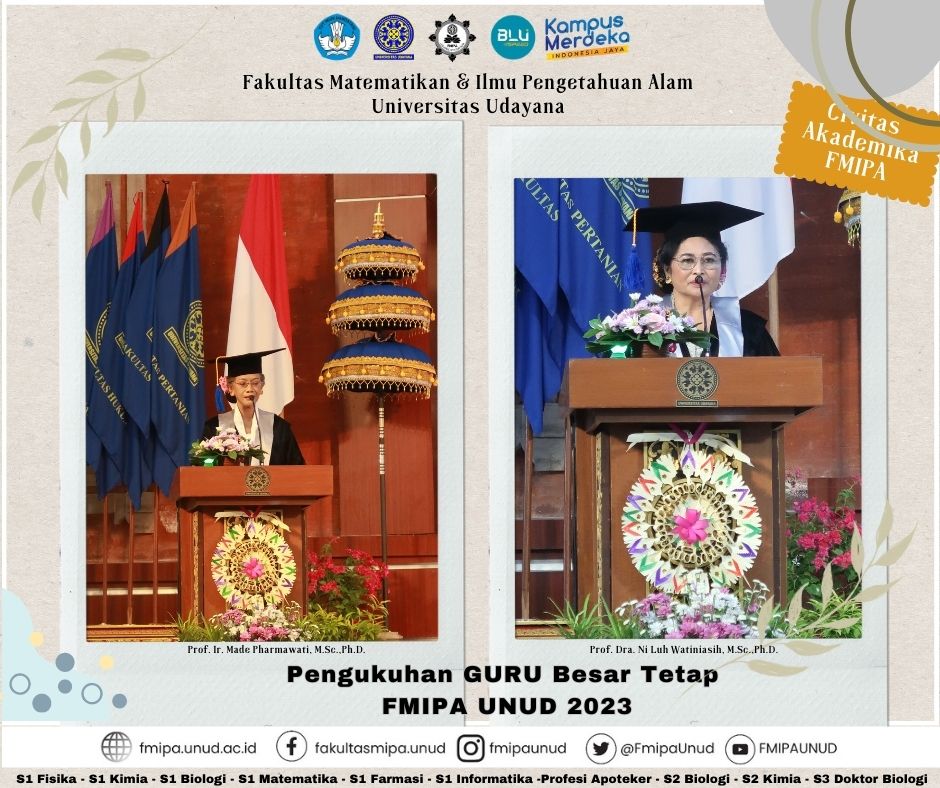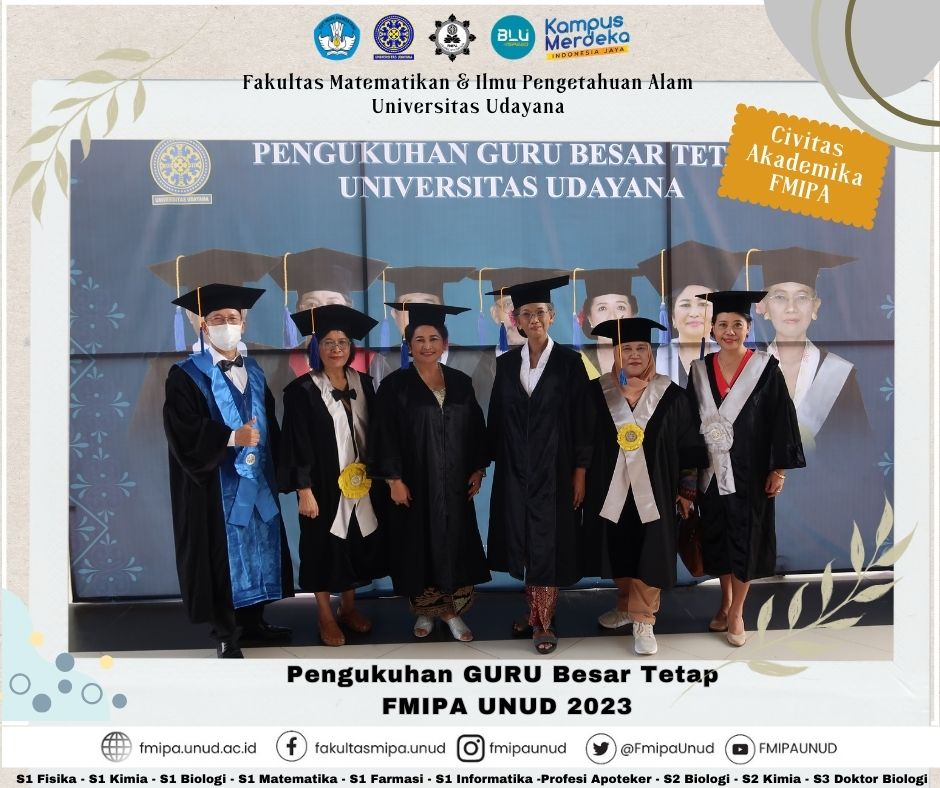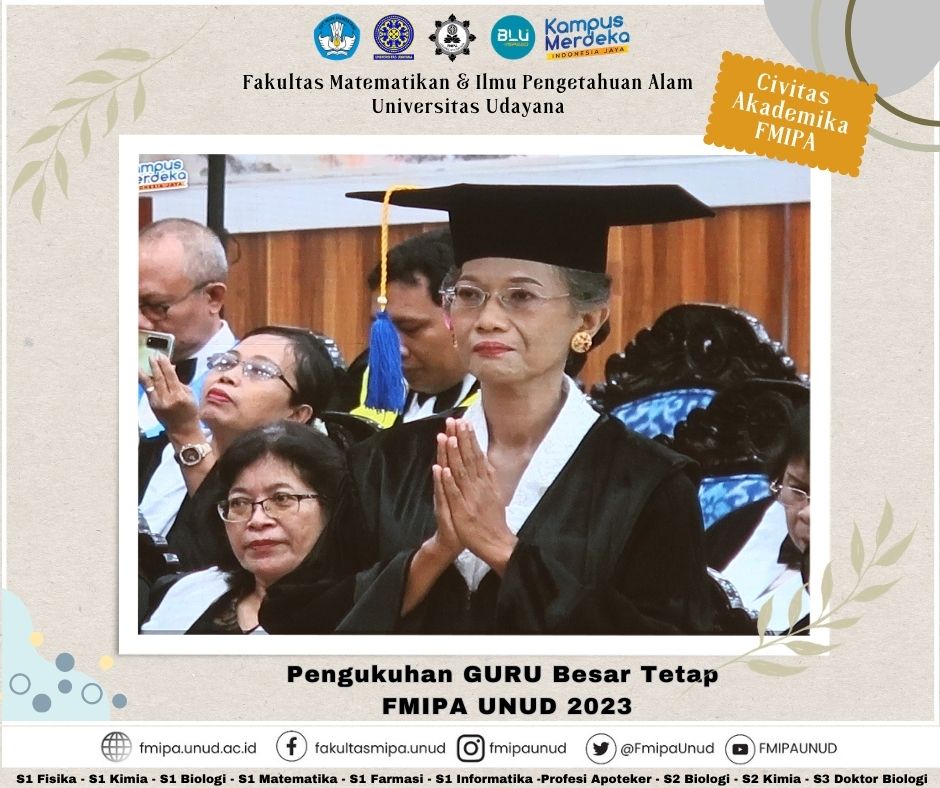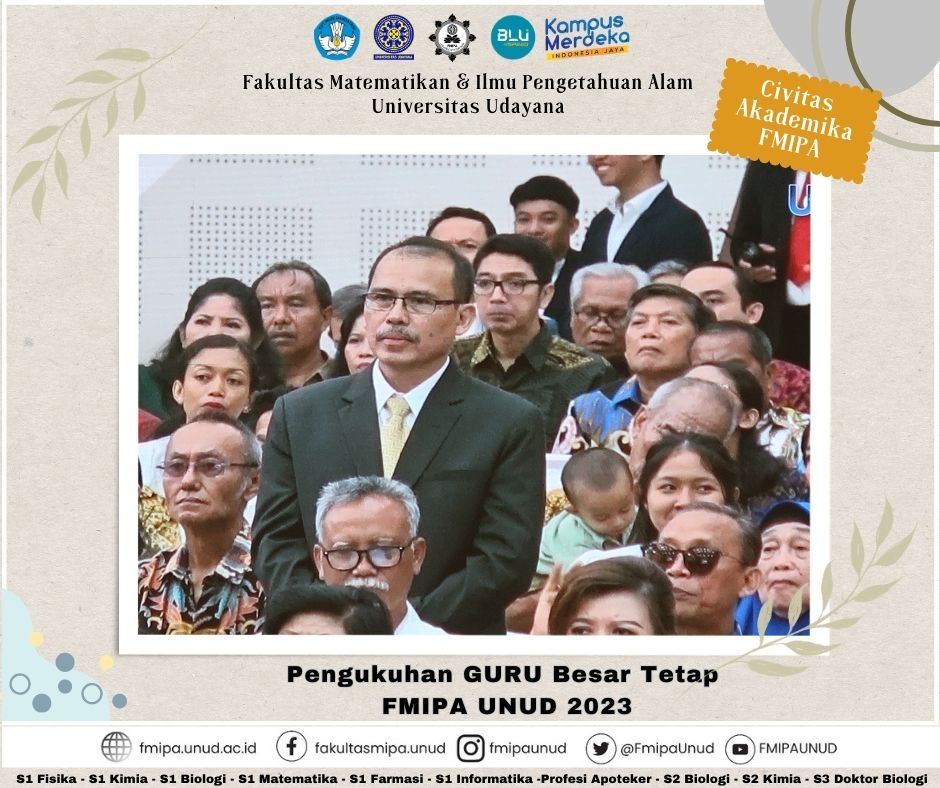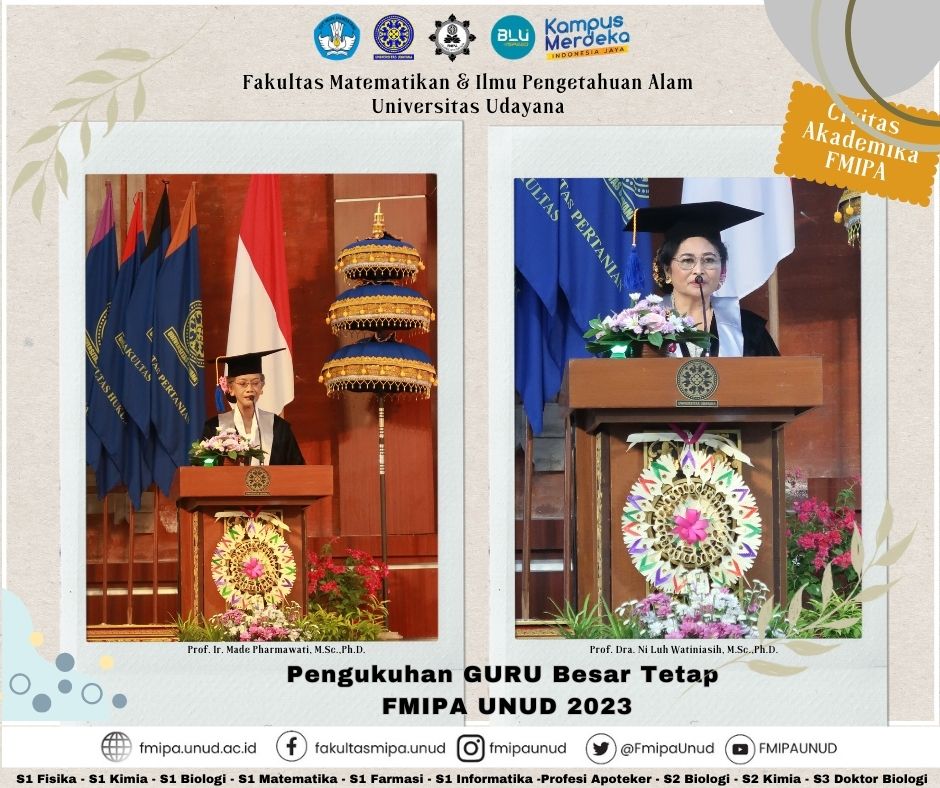FMIPA is proud that the Rector of UNUD Inaugurates 3 New FMIPA Professors
Jimbaran - FMIPA UNUD feels proud because Udayana University (Unud) has again confirmed eight Permanent Professors which were held at the Widya Sabha Auditorium Building Unud Campus Jimbaran, Saturday (10/6/2023). The eight Professors who were inaugurated at the event were Prof. Dr. Nyoman Gunantara, ST.,MT. (Professor in the field of Telecommunication Engineering at the Faculty of Engineering), Prof. Dr. Urged Putu Dewi Kasih, S.H., M.Hum. (Professor in the field of Law at the Faculty of Law), Alm. Prof. Dr. dr. Meitini Wahyuni Proborini, M.Sc.,St. (Professor in the field of Mycology/Biology at the Faculty of Mathematics and Natural Sciences), Prof. Dr. Eng. Ir. Made Sucipta, ST., MT., IPM. (Professor in the field of Thermo-fluid Science of Energy and Material Systems at the Faculty of Engineering), Prof. Dr. Ir. I Dewa Putu Oka Suardi, M.Sc. (Professor in the field of Agricultural Extension at the Faculty of Agriculture), Prof. Dr. dr. Ni Wayan Sukarini, M.Hum. (Professor in the field of Linguistics/Semiotics at the Faculty of Cultural Sciences), Prof. dr. Ni Luh Watiniasih, M.Sc.,Ph.D. (Professor in the field of Ecology at the Faculty of Mathematics and Natural Sciences), and Prof. Ir. Made Pharmawati, M.Sc.,Ph.D. (Professor in the field of Genetics at the Faculty of Mathematics and Natural Sciences). Of the eight new professors, there are 3 FMIPA professors, namely:
- (Alm) Prof. Dr. dr. Meitini Wahyuni Proborini, M.Sc.,St. (Professor in the field of Mycology/Biology at the Faculty of Mathematics and Natural Sciences)
- Prof. dr. Ni Luh Watiniasih, M.Sc.,Ph.D. (Professor in the field of Ecology at the Faculty of Mathematics and Natural Sciences),
- Prof. Ir. Made Pharmawati, M.Sc.,Ph.D. (Professor in the field of Genetics at the Faculty of Mathematics and Natural Sciences)
Unud Chancellor, Prof. I Nyoman Gde Antara in his speech expressed his pride because Unud has again given birth to 8 permanent professors. This means that Unud has additional human resources who have academic capacity that is not in doubt. Currently UNUD has a total of 199 professors or 15 percent of professors from the total active lecturers which at the same time shows that UNUD has exceeded the ministry's target regarding the minimum number of professors at a university, namely 10%. This of course will make Unud's presence in the community more recognized and have a positive impact on improving quality and will further encourage Unud to achieve its goals of becoming a World Class University. With a large number of Head Lecturers, it means that we have great potential to be more optimistic about increasing the number of Professors at Udayana University. Hopefully today's Professorial inauguration will also inspire other academics to become Professors soon. "With the increasing number of superior human resources at the university that we love, we can guard Udayana University to be able to compete at the national level as well as at the international level," said the Chancellor of Unud.
While Secretary of the Unud Professor Forum Prof. Dr. drh. Nyoman Sadra Dharmawan, MS, representing the Head of the Forum, in his remarks congratulated the Professors who had been inaugurated. The position of professor or professor is the highest academic position in tertiary institutions which is given to those who are still active. It is hoped that all of them will continue to work professionally and become role models for our juniors. Moreover, in connection with the current institution of Udayana University is being transformed towards internationalization, the role as a professor is very meaningful in this regard. Be a role model in yourself, at university, and in society. International recognition can be seen from the educational achievements of our institution, these achievements are called outcome base education, this requires an outcome base curriculum and an outcome base curriculum requires an outcome base teaching and learning process as well as an outcome base evaluation. We must continue to work, especially the implementation of higher education, teaching education, as well as research and community service. In the educational process, when the outcome base curriculum is demanded, we will contribute to an achievement-based curriculum. In addition, the teaching and learning process must also be achievement-based. In the teaching and learning process, the learning process should be actualized using more recent case- and project-based learning processes.
"Furthermore, in research and service, in addition to referring to national education standards and Unud standards, it is also our responsibility as professors on internationalization issues," he said.
In his scientific oration entitled "Human resilience and adaptability to climate change", Prof. dr. Ni Luh Watiniasih, M.Sc.,Ph.D. said that the current climate change is mostly due to human activities resulting in an increase in temperature which is predicted to increase by around 1.5ºC in 2050 and 2-4 ºC in 2100. This certainly needs attention because this climate change can disrupt natural balance, such as: Biodiversity loss, Loss of animal species, Change of ecosystem services, Ocean acidification, Plant life, Extreme weather. To anticipate this climate change, Watiniasih conveyed several steps that could be taken including: planting peat forests and pineapple plants, seagrass biomass as a place to store carbon-climate mitigation, coral restoration, Small Acts big impact (Reuse reduce, recycle, turn off lights and air conditioning when not used, dispose of it in its place, and group waste according to category)
Meanwhile Prof. Ir. Made Pharmawati, M.Sc.,Ph.D. in his scientific oration entitled "MOLECULAR MARKERS IN THE CHARACTERIZATION AND CONSERVATION OF GENETIC RESOURCES" conveyed that Genetic Resources (SDG) are genetic material that has potential value. SDGs have an important role in agriculture, fisheries, animal husbandry, forestry, health activities, where these SDGs are the key to diverse food sources, sources of medicines and the adaptability of plants and animals to climate change. So that good management of SDGs (exploration, inventory, data collection and conservation) will be able to increase the use-value of SDG materials and of course be able to improve people's welfare.
